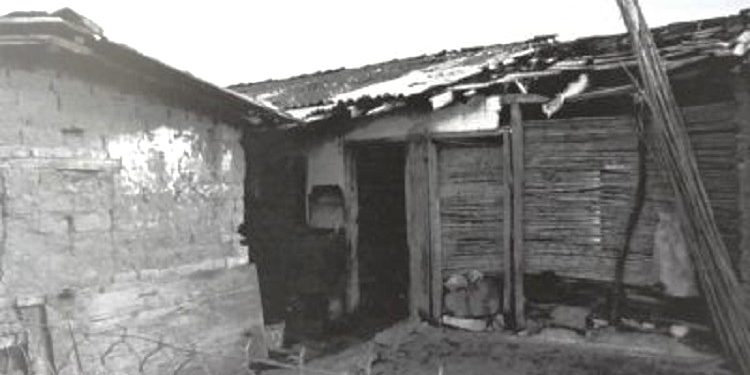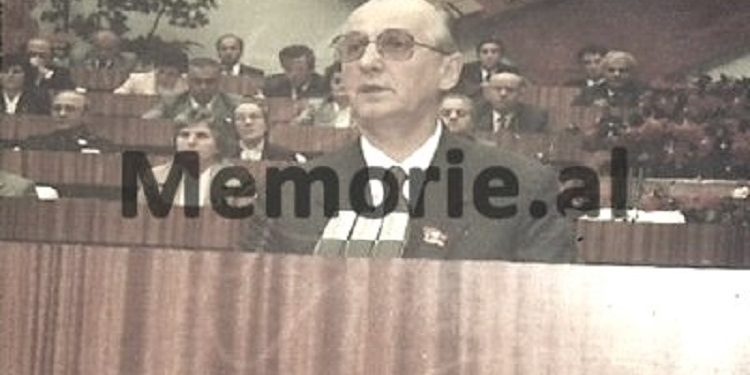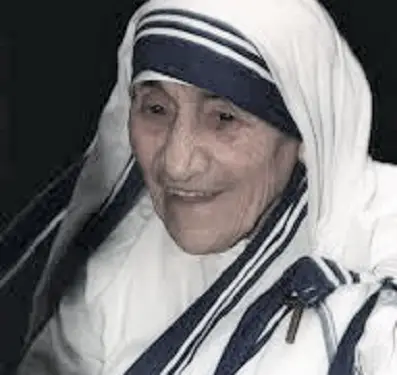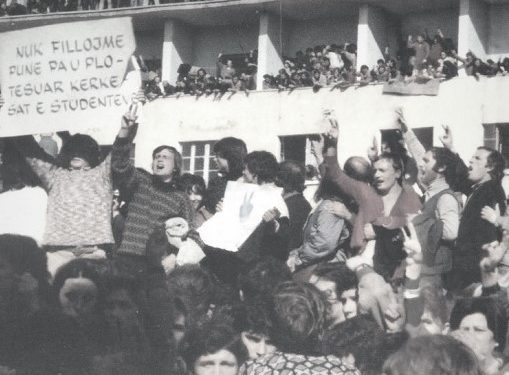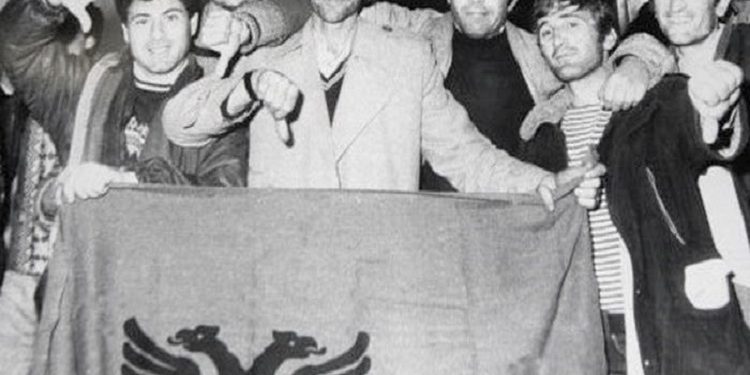BY PROF. ASSOC. DR. GJERGJ P. TITANI
Part Six
Memorie.al / In this article, we are publishing a long interview with the “Artist of the People” and “Great Master of Labor,” the distinguished composer Dhora Leka. The conversation with her started a long time ago, but almost nothing has been published, because her wish was to finish her memoirs, summarizing them in a special book with the title; “Moments and Impressions from My Life.” The book has been reworked several times and has been cross-referenced with both archival documents and her personal family archive. Today we are publishing the first presentation with the distinguished composer, which will continue for several issues.
Continued from the previous issue
DHORA LEKA; THE REGRET OF FEBRUARY 20, 1991, WHAT I EXPERIENCED?!
Mrs. Dhora, until today we have described the entire ordeal of your life’s sufferings and sacrifices, can you tell us when it ended?
No matter how long the night is, in this case the persecution, the day will finally break. Throughout the long ordeal of the difficult road to hell, what has kept me alive, not only kept me alive, but also thousands of others, who walked this ordeal. What kept us all alive and gave us strength so that the pain would not defeat us was the hope that one day this ordeal would come to an end.
Although isolated, the echo of the events that were taking place in Tirana from the end of ’89, such as: the explosion of the embassies, the democratic movements in the Film Studio, the Higher Institute of Arts, and especially the revolts and strikes of the students of the State University of Tirana, were the prelude that the days of the collapse of the dictatorship were near and inevitable.
The culminating point of this revolt that took on the dimensions of a nationwide Revolution was February 20, 1991, when the monument of the dictator Enver Hoxha was finally overthrown and torn from its pedestal.
I regret that I was not physically present in that magnificent revolt on those days, but I experienced it as if I were there. At that time I was still confined to Sheq-Marinëz. The days that followed were days of anxiety, so I will not dwell on them, as those events are known to the entire Albanian people. It was precisely those massive revolts led by the students that brought about pluralism in Albania.
How did you move from Sheq-Marinëz and where did you go?
The long-awaited day finally came. The dictatorship was crumbling and with it the instruments of oppression and violence. The system was in crisis, the merciless Committee of Punishment and Internment, which was the most hated and shameful executioner that the communist dictatorship had invented, had been legally dissolved. The dictatorship was overthrown and with it the entire political system.
We, the interned and the expelled, no longer needed the approval of the all-powerful Head of the Internal Affairs Branch to get permission to move from “our concentration camp,” which was called Sheq-Marinëz. All of us as a family could not wait to “fly” to Tirana.
We loaded up what “scraps of luggage” we had and, surprisingly, our friends and well-wishers opened their doors to shelter us. Along with all the great democratic changes and transformations that had happened and were happening, we were all included with all our soul.
My nephews and niece, along with their families, were swept away by the powerful wave of mass emigration, which was so characteristic of those days. They all emigrated, in early 1992, to Greece. Meanwhile, I, with my sister and her eldest daughter who had suffered a severe trauma as a result of the long and merciless dictatorial persecution…!
And you were you involved in the vortex of the country’s transformations?
I was looking forward to experiencing them powerfully with all the diversity and grandeur of these democratic transformations. I remember as if it were today my first activity of those days, which happened on the occasion of “March 8,” International Women’s Day.
The newly created Forum of Democratic Women of Tirana organized a magnificent mass rally in “Skanderbeg” Square. It was the first time after so many years that I was taking part in such an activity. I, among others, who represented the persecuted women, also greeted the rally.
Such a fact was very touching and I remember saying these emotional words: “Turn back time and look at that empty place, this is how all the dictators of yesterday and today will end.
We love Albania without Ramiz Alia,” – and all the participants in the rally, in unison, cheered: “We love Albania without Ramiz Alia. We love Albania without Ramiz Alia.” Those days the pre-election campaign of March 22, 1992, was going on.
What else can you add?
I have participated in many activities, but the one that has left me with the most impressions is “The First Swallow,” when Colonel Pandeli Prifti, former director of the Central Army House, within the framework of the column; “Fighters determined for freedom and democracy,” organized a cultural-artistic evening with the title; “Song in the Storm,” dedicated to my musical and literary life and activity. This happened on April 30, 1992.
There have been numerous subsequent activities which followed one after another, inside and outside the country, and which had no small echo in the USA, in the meeting with the Albanian-American community of Bridgeport, where the delegation of women who had come specially from Boston also arrived. Likewise, various activities that I have developed in England, Italy, Greece, Russia, and the Vatican have also left such impressions on me.
In December ’92, when I went to Germany, I met for the first time, after 40 years, with a classmate of mine, the distinguished violinist Mark Lubockij, who on this occasion had organized a meeting-concert at the “Horshule” academy in Hamburg, where Mrs. Sybyla Ahlers, president of the International Association AIDA (International Association for the Protection of Persecuted Artists), also took part.
For years on end, these two people, very respected by me, have organized concerts in various cities of Germany with parts from my musical creations. I want to emphasize that what has impressed me is that the concerts in Germany are the only ones where I have received royalties, which none of my works in my country has yet had the fortune to have.
From your trips abroad, what left you with the greatest impressions?
The greatest impressions were left on me by my participation in the Vatican, where the ceremony of the “Beatification of Mother Teresa” took place. I have known the name of Mother Teresa and her life since the early ’50s. I used to go in and out of the house of Gonxhe Bojaxhiu’s mother, which was somewhere on “Kavaja Street,” there I also met her sister, Agen.
One day I found them very happy, a rare thing, Ageja told me that they had received a letter from Gonxheja, which an unknown person had brought to them, and among other things she announced to them that she was in India, in Calcutta.
On this occasion they also showed me a photograph where Mother Teresa was dressed as we know her and were among the poor Indians. We often talked about Mother Teresa even when my teacher “Artist of the People,” Marije Kraja, was around.
After this, I was interned. And only when I returned to Tirana after the democratic transformations, Maria told me about the difficult life that Lokja and Ageja had, until the moment they closed their eyes.
She told me how she had kept their personal relics as well, and that she was the one who had taken care of their burial. Mother Teresa has come to Albania several times, the first time I was in internment in Sheq-Marinëz and then I wrote some verses:
“IF MOTHER TERESA KNEW”?
“If Mother Teresa knew:
What people suffer, in “free Albania?”
how her sister was treated
how her Lokja’s lip trembled,
her heart, seized with anxiety lest she be
alone at the hearth. No. Never no, Gonxha would not send
flowers to the grave of Enver, this “synonym”.
Of violence, appropriation, terror!
Internment; Sheq-Marinëz, August 16, 1989
Years later, when a concert was organized by the national orchestra “Madre Tereza,” an “Ode” of mine dedicated to Mother Teresa, with verses by Professor Gjergj Titani, was also performed, which was sung by the “Artist of the People,” Gaqo Çako.
I was happy that I had written this beautiful ode and there was no greater emotion for me, when I remembered the moment I met Mother Teresa in Tirana and when she blessed me, putting her hand on my head and said to me: “May God be blessed…”!
Unforgettable for me has remained the participation in the celebration of the 60th anniversary of the victory over Nazi Germany, where I was specially invited by the President of the Russian Federation, Vladimir Vladimirovich Putin, in Moscow, in the Kremlin.
In these celebrations, along with other personalities, our President, Mr. Alfred Moisiu, was also invited. At the big reception held in the Kremlin for all the guests, where I was also present, a miracle happened to me.
After 52 years, I met my classmate, the distinguished Russian composer, Aleksandra Pakhmutova, who was represented at the great festive concert with a symphonic creation dedicated to the Battle of Stalingrad.
The meeting with my friend or, as we called each other in our student years; “Doruchka,” she and “Alluchka,” me, hand in hand we went to the Russian president, next to whom were also the US President Bush, the German Chancellor Schröder, the French President Chirac, and many others.
We stood before Putin who was stunned by this surprise and especially when I spoke to him in Russian and said: “Until now, Mr. Putin, you have greeted politicians, diplomats, prime ministers, etc. You are being greeted by two classmates, who after 52 years meet here in the Kremlin, the day of this jubilee had to come for our half-century dream to be realized.”
Suddenly my friend snatched the word from me, saying to him: “We were students at the ‘Tchaikovsky’ Conservatory in Moscow. This is my dear friend Dhora Leka, a great Albanian composer who composed partisan songs during the War in Albania,” and we left under the applause of those present. These images have remained fixed by the cameras of Russian televisions and Albanian Radio-Television, etc.
Mrs. Dhora, what are you currently doing?
I would like to be young, not 82 years old. But, my heart is still young, although I have started to feel the weight of the years on my shoulders. I try not to come to terms with this truth. Many dreams and desires have remained unrealized for me. My mother lived 94 years, I would very much like to resemble her, not only in longevity but also in her character traits, which I have expressed in the story; “My Mother.”
However, every bad thing has its good sides and when I list them in my book; “Moments and Impressions from My Life,” I want nothing to escape me and to reflect it in black and white. My stay in Gjirokastër was a great school for me. I fell in love with the Lab song and put it to music, I wrote songs, romances, but above all the vocal-symphonic poem “Stay my friends, stay” and I wrote the first verses:
“THE CANARY WAS CLOSED IN A CAGE”
“They closed the Canary
in a cage, – Be quiet they told it,
we don’t need your song
infected with Freedom…
…but the fiery song
infused with Freedom,
the Canary did not stop
even though: they closed it
in a cage!…
After 40 years in the city of Gjirokastër, where the difficult road to hell began, the conductor Roland Çene “Merited Artist,” Director of the Gjirokastër Cultural Center, organized a concert with my creations, while the municipality of the city awarded me the title “Honorary Citizen” of Gjirokastër. During the years of imprisonment, I was only physically imprisoned, but in my mind I was free, freer than a free citizen, and I wove verses.
After getting out of prison I lived in Berat, but I didn’t just mend sacks, I found strength and wrote my dream, my opera “Song in the Storm.” And in the successive internments, besides the heavy physical work I did every day, I constantly wove verses.
In Fier I was not just a dressmaker, but I found strength and inspiration to compose my second opera; “To the Mountains for Freedom,” dedicated to Zonja Çurres. A strange courses this life of mine and I would not trade it for anything. I thank fate for weaving this life for me. / Memorie.al





